Christianity is the revelation of God in Jesus Christ and is the religion set forth in the Scriptures. Jesus Christ is foretold in the Old Testament, presented in the New Testament, and proclaimed by the Christian Church in every age and in every land.
Founded in the interest of offering a church home to all who confess and believe, the Universal Fellowship of Metropolitan Community Churches moves in the mainstream of Christianity.
Our faith is based upon the principles outlined in the historic creeds: Apostles and Nicene.
MCC Statement of Faith:
Metropolitan Community Churches is one chapter in the story of the Church, the Body of Christ.
We are people on a journey, learning to live into our spirituality, while affirming our bodies, our genders, our sexualities.
We don’t all believe exactly the same things.
And yet in the midst of our diversity, we build community, grounded in God’s radically inclusive love for all people.
We are part of an ongoing conversation on matters of belief and faith,
shaped by scripture and the historic creeds, building on those who have come before us. Our chapter begins when God says to us: “Come, taste and see.”
“Come, taste, and see.” Jesus Christ, You invite all people to Your open table.
You make us your people, a beloved community. You restore the joy of our relationship with God, even in the midst of loneliness, despair, and degradation. We are each unique and we all belong, a priesthood of all believers. Baptized and filled with Your Holy Spirit, You empower us to be Your healing presence in a hurting world.
We expect to see Your reign on earth
as it is in heaven as we work toward a world where everyone has enough, wars cease, and all creation lives in harmony. We affirm Your charge to all of humanity to care for the land, sea, and air. Therefore, we will actively resist systems and structures which are destroying Your creation.
With all of creation we worship You
—every tribe, every language, every people, every nation. We know You by many names, Triune God (Creator, Redeemer, Holy Spirit), beyond comprehension, revealed to us in Jesus Christ, who invites us to the feast. Amen.
Former Statement of Faith:
- We believe in one triune God, omnipotent, omnipresent and omniscient, of one substance and of three persons: God, our Parent-Creator; Jesus Christ, the only begotten son of God, God in flesh, human; and the Holy Spirit, God as our Sustainer.
- We believe that the Bible is the divinely inspired Word of God, showing forth God to every person through the law and the prophets, and finally, completely and ultimately on earth in the being of Jesus Christ.
- We believe that Jesus, the Christ, historically recorded as living some 2,000 years before this writing, is God incarnate, of human birth, fully God and fully human, and that by being one with God, Jesus has demonstrated once and forever that all people are likewise Children of God, being spiritually made in God’s image.
- We believe that the Holy Spirit is God making known God’s love and interest to all people. The Holy Spirit is God, available to and working through all who are willing to place their welfare in God’s keeping.
- Every person is justified by grace to God through faith in Jesus Christ.
- We are saved from loneliness, despair and degradation through God’s gift of grace, as was declared by our Savior. Such grace is not earned, but is a pure gift from a God of pure love. We further commend the community of the faithful to a life of prayer; to seek genuine forgiveness for unkind, thoughtless and unloving acts; and to a committed life of Christian service.
- The Church serves to bring all people to God through Christ. To this end, it shall arrange for regular services of worship, prayer, interpretation of the Scriptures, and edification through the teaching and preaching of the Word.
Our Mission
Open Table MCC Mission as ratified and affirmed last August 26, 2017.
Open Table MCC has 3 missions:
- We are tasked in maintaining a safe and welcoming Church community and space for everyone. Equally, everyone who comes and participates in the life of the Church have a shared responsibility to sustain the welcoming and safe space of the community.
- As people named after Christ, we are called to joyfully and prophetically proclaim the radically inclusive love of God for all people as evident in the life and teachings of Jesus Christ read in scripture and experienced in community life. Our proclamation is first and foremost in the manner we live our lives and the relationships we create and sustain. Our lives are the embodiment of Christ’s love. After we become the living embodiment of God’s love, can we only begin to proclaim through teaching and preaching.
- As followers of the One who served and died on the Cross, we are called to participate in God’s greater and wider work of justice and peace in the world through solidarity, community life and proactive-service to those who need God the most.
Some Theological Guidelines and Understandings
by Pastor Joseph San Jose
NOTICE: The following theological perspectives are those that Pastor Joseph teach and inculcate in Open Table MCC as the Pastor of the Church. However, it does NOT mean to say that the following are doctrines and dogmas of Open Table MCC.
Coming Out as a Spiritual Sacrament
The truth of who we are as human persons with all our rights and inherent dignity is the first solid and evident good news. We are all created in the image and likeness of God as human persons. To accept who we are which includes our sexuality and gender identity is a spiritual sacrament that is often forgotten and neglected. We are sacramentum. We are sacred and a channel of the sacred. We are with grace and channels of God’s grace.
However, Queer people – lesbians, gays, bisexuals, transgenders, intersexed and other sexual minorities – over the ages have had to live in denial of a significant part of who God created them to be. queer people had to live in self-denial and hatred, in fear and in terror, under great forms of oppression and discrimination and in some cases violence and death. In some parts of the world, queer people continue to experience these things and live in terrible conditions. MCC therefore believes in the power and healing grace of Coming Out. In places and situations where queer folks are able to courageously Come Out in the full acceptance of themselves and to begin living out the truth of their existence, can certainly be considered as a Spiritual Sacrament that changes not only their lives but also of many others. We hope and pray that all LGBTQI persons and other minorities will one day experience the transformative and sacramental power of “Coming Out” and living the truth of their real selves.
What is Faith?
Faith comes from the latin word Fides and it means “loyalty” or “commitment towards”. In the New Testament language of Koine Greek it is ‘Pistis’ which means reliability, trust confidence and fidelity. In Hebrew ‘faith’ is “amanah” from the root “aman” and understood as agreement or covenant.
Faith is not merely a set of beliefs which are intellectual assertion or intellectual acceptance of concepts about God, Jesus, the Spirit and the cosmos. Surely faith begins with that. We have to have some form of intentional understanding and acceptance of God however, faith is much more. The Jews then and today understands faith as loyalty and commitment to their covenantal relationship with Yahweh. Early Christians coming from their Jewish roots also understood faith in Christ as an active and passionate commitment to Jesus, his life and all that he taught so much so that like him they were willing to die for Jesus and his Gospel (Good News).
Faith (Commitment) is both individual and communal. It is individual because we make individual decisions and intentions to live-out our Christian (faith) commitment. It is communal and collective because our relationship with God can only be expressed with our loving relationship with others. There will always be this tension between individual faith and communal faith, because as our MCC Statement says, “we don’t all believe exactly the same things”. We commit ourselves to a faith that will always be in conversation with one another, and through it discern the revelation of the Holy Spirit in our ever changing context and shared ministry to the world.
A Biblical-Theological Understanding of ‘Church’ (Ecclesiology)?
Church is the gathered people of God sent out to participate in God’s work of justice in the world. It is not the physical building where we gather and worship. The Church is the living, moving and breathing Body of Christ on earth with each individual as an important part and component of this body as articulated by Paul in his first letter to the Corinthians chapter 12 and his letter to the Romans also in chapter 12.
In the Hebrew Scripture and more so in the Christian Scripture and long after, in every age and place, God has called us to be gathered together as God’s people. God calls us to be in Community and to be in a collective and covenantal relationship with each other. The Ecclesia, or the Church is the gathering of the people of God with shared set of core beliefs, common mission and a collective and active ministry while celebrating the diversity of the same body.
The Greek Ekklesia during the time of the early Christians, particularly of Paul was a term understood as a political gathering of those who were called. The Greeks called for an Ekklesia whenever there is any political or social issue that needed to be decided or debated. The Roman Republic perceived Ekklesia in the same manner and did likewise. So when Paul wrote about the believers as Ekklesia and believers and Paul knew that to be Ekklesia is to be political and social in light of the Gospel of Jesus Christ – To proclaim goodnews to the poor, sight to the blind, release to captives and declare the day of the Lord (Jubilee).
This is why the Church is the mission and the Church does missions. The Church exist primarily to be the mission in the world and participating in the ushering of the reign of God on earth where true justice, equity and peace exist. Therefore the Church are people sent out as followers of the One who went here and there serving, ministering, proclaiming and changing the world.
There is this creative and dynamic tension between the Church as a gathered community and the Church as people sent out and scattered to do mission.
We also understand and recognize the Church as imperfect, for its individual members are imperfect. It has been perfected by the grace and gifts poured out into it in order to do mission and thrive in its community life at the same time it is called to individually and collectively reform and transform itself again and again under the same grace of God through Christ, in order to effectively reform and transform the world.
“Ecclesia reformata semper reformanda”
What Do We Mean By Progressive and Queer Affirming?
A Church is described or labelled as progressive as a direct contrast to what is described or labelled as conservative and fundamentalist Church.
A progressive Church is and should be Queer affirming.
A Progressive Church has a few things in common with conservatives:
- We believe in God revealed to us through Jesus Christ and the Holy Spirit continues to guide people towards Christians truth (of course we disagree on what are Christian truths and how they are understood).
- We believe that Jesus is the Word of God.
- We believe that the Christian faithful are to be gathered together as the Church and to be sent out to the world to do mission (Of course we disagree on what and how mission is).
- We believe that the Bible is the INSPIRED word of God (There is difference in the understanding of what it means for the Bible to be inspired by God).
What then Constitutes Progressive Church?
- For most progressives we commit ourselves to Jesus Christ as our source of truth, way and life. However we recognize that truth is plural and that God in many times, places and peoples, is experienced and expressed in diverse ways
- For most progressives, we believe that Jesus is the Word of God and not the written Bible. The Bible, or the written scriptures tells us how the Jewish people experienced God in the Hebrew (Old) Testament and it tells us how the first followers of Jesus experienced Christ. However the Word of God, which is Jesus is continued to be experienced by us today and continues to reveal himself to many of people in a multitude of ways. God did not stop speaking after the Bible was compiled and closed.
- The Church is the Body of Christ on earth on a mission. Our mission is not necessarily to proselytize and convert people to accept and follow certain sets of Christian doctrines and rules. The Church is not a corporation or institution to make profits. The mission of the Church as Jesus did was to proclaim and usher the reign of God, which is a world of justice, equity and peace rooted in love where everyone is included and participates.
- The Bible is NOT the literal word of God. The Bible and its many books are human literary products of their times. It is human and speaks of many human things and even human brokenness, however it is inspired because the various writers and redactors experienced the presence of God in their lives and in their communities and wrote about them. Our barometer and main interpretative guideline to reading and preaching the biblical scriptures is that of love, justice and equity.
- Progressives use modern scientific, academic and theoretical methods of reading and interpreting scripture placing great consideration to the context of the biblical texts and the context of today, especially those of the oppressed.
- Progressives has an unwavering commitment to Justice. We Follow Jesus and are not stuck in merely worshiping and praying. Holiness is Social Holiness as John Wesley proclaimed.
- Progressives believes in inclusion and welcome of LGBTQI persons. We uphold and commit to the equal and equitable rights and dignity of all people; women and men, LGBTQI and heterosexuals, the poor and oppressed, of various ethnicities and races, cultures and differing faiths.
- Progressives believes that sexuality, gender identity and gender expression is a gift from God over and beyond the confines of pro-creation. As much as we uphold reproduction we also uphold that sex was given to people for intimacy and pleasure expressed and practiced in appropriate and healthy ways.
- Progressives believes in science and its findings, discoveries and innovations especially those that promote development and progress to the lives of people, particularly those of the poor and the oppressed.
- Progressives also has a commitment to the protection of the environment. Progressives actively resist any political and economic systems, policies and ideologies that destroys God’s creation, human lives and people’s communities.
The Word of God and The Words About God (Scripture)
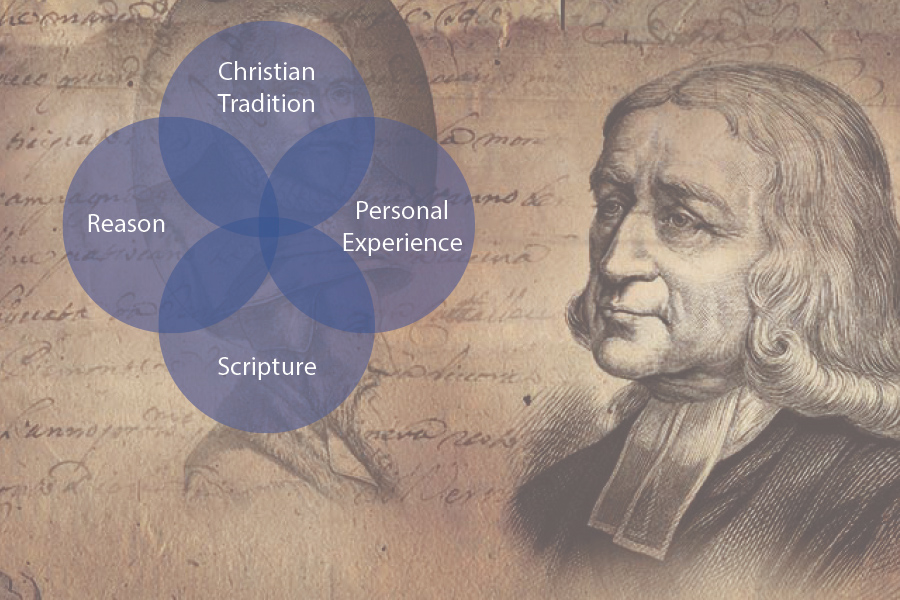
The Wesleyan Model
Jesus Christ is the Word of God. Jesus Christ is a living and moving Word that has spoken throughout the ages and continues to speak to us today through the words of scripture, which is the written word of and about God. The Word of God also speaks to us today through our human experiences as individuals and as a community of believers. Christ, speaks to us today also through our individual and collective reason or intellect as we try to discern and learn about God by the use of our God given intellectual faculties. And Christ also speaks to us through the wealth of our heritage, history and tradition.
The Word of God, who is Christ, through the Spirit as explained by the Wesleyan tradition continues to reveals himself to all of us through Scripture, Reason, Experience and Tradition in dynamic conversation with each other.
What is Sin (Harmatiology)?
Sin is a fracturing or breaking of our “covenantal relationships” in ways that are hurtful, violent and even deadly. One can say that sin is the breaking of faith, albeit the breaking of our commitment or covenant.
Actions and words, intentionally or unintentionally, that hurt, abuse, exploit and kill other people are therefore sin or an offense to God and the victim/s. However, what may be called sin on an individual level has to be taken contextually and circumstantially. Sometimes there are necessary actions and words that may hurt others but such actions and words were done for truth, justice and greater good. For example, to tell someone who is attracted to you that you are not attracted to them is a necessary truth to say even if it may hurt the other person. Another example is the necessity of self-defense – to save one’s life and other innocents from a violent assailant is a necessary action for the greater good.

Sin is not just personal, it is also structural and systemic. We have continuing social, political, economic and religious sins, then and today, that has caused and continue to cause the death, suffering and discrimination of many people. Poverty, racism, religious intolerance and extremism, homophobia and transphobia, sexism, misogyny, sexual violence, war, occupation and environmental degradation are all forms of systemic and structural sins we are all guilty of.
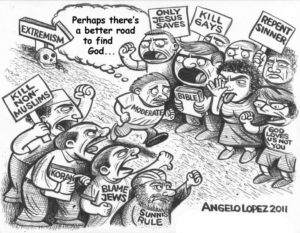
When religion is used to colonize and dominate; when the Bible or any sacred text is used to discriminate, marginalized and violate other people in the name of God through a literalist method; when religious doctrine and dogma is imposed upon other cultures and faiths; when genocide is done out of the conviction of one or several faiths, all of these are sins and crimes against God and humanity.
We are called to resist not only personal sins but even more so the sins of the social and religious systems we create and perpetuate.
Homosexuality is NOT a Sin
MCC is the pioneer Church denomination that first radically proclaimed that God loves the LGBTQI Community and to say that homosexuality and its expression or practice within appropriate, mutually consensual and loving ways are not sinful. Homosexuals and other gender and sexual minorities are beloved of God and are created in the Divine image. LGBTQI people as with all people are called to a life of love, respect, kindness, holiness and service. Harmful actions and words by any person irrespective of sexuality and gender identity such as but not limited to rape, physical violence, verbal abuse, sexual assault and the likes are abominations that merit criminal accountability and moral condemnation. LGBTQI or Queer people are children of God with gifts and are integral members of the body of Christ, the Church.
Based on a careful and scholarly study of scripture and in recognition of modern sciences about sexuality and gender, MCC has prophetically declared and courageously demanded the inclusion, acceptance and protection of LGBTQI persons and communities.
Salvation (Soteriology)
There are many understanding of ‘salvation’. It means being ‘saved’ from hell and sin, and eventually being with God in some ‘heavenly’ realm either after we die or after judgement day. Salvation is not just some metaphysical reward after death or in some future end-time.
Salvation is also here and now. People are saved and transformed even as we all live in this good earth. We are called to save people from hellish living conditions brought about by our systemic structures of greed, violence and oppression. We are all called to experience God’s reign here, for us, for everyone, but most especially for the poor and the oppressed.
Priesthood of All Believers and the Ordained Ministry
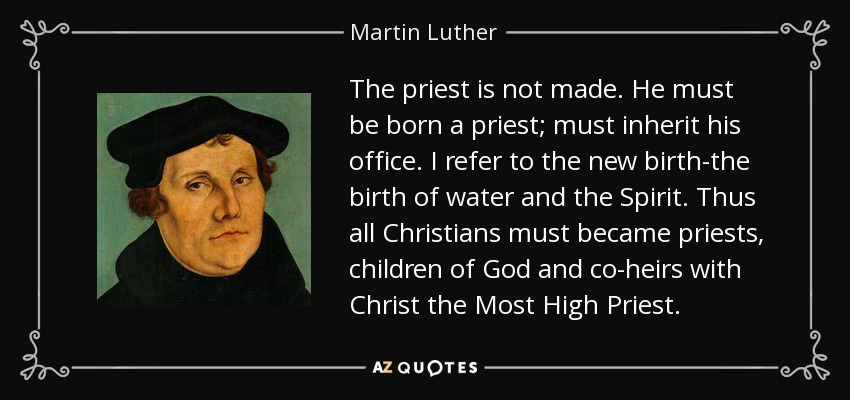
MCC believes strongly in the Priesthood of All Believers tracing its roots to the protestant reformation whereby the reason, power and capacity to minister and serve others, even in sacrament and word is given to all baptized Christians. Everyone has a priestly, prophetic and pastoral mission and calling to minister to one another and the world.
The ordained ministry is not over and above any Christian person. The Ordained ministry is a ministry equal to the other ministries of the Church. As every Christian is called to discern God’s calling in our lives, so is the ordained ministry. It is a daily discernment and response to God’s call. Persons called to the ordained ministry are those whose calling is to do professional pastoral ministry in areas of pastoral care, preaching and teaching, and the sacraments in order to equip and edify the congregation, the ekklesia. The Ordination in MCC is not set in stone. The Ordination of individuals are effective and affective only by the authorization of the Denomination and by the calling of the Church community. Anyone who retires, gets suspended or whose ordination license is terminated goes back to being a lay person and to the shared and common priesthood of all the faithful. Retired clergy to some extent, because of years of honorable and active service are conferred with honorary title of reverend and to some as elder. They will have perpetual voting privilege in General Conference inside the clergy-house. However, theologically and organizationally as they are already retired from licensed service, they are lay persons who continues to live-out their shared and common priesthood with everyone.
In MCC, lay persons may officiate and consecrate communion as long as proper training and equipping has been provided.
Lay Pastoral Leader
In situations and circumstances that there is no available Ordained Clergy-person. The Church community may elect and/or hire lay persons from within to be the Lay Pastoral Leader of the Church. The denomination confirms and authorizes the Lay Pastor to lead, represent and organize the local Church that called her/him. The Lay Pastor in the local level then is given the same pastoral authority, duties and functions as an Ordained Clergy-person in relation to the preaching and teaching of the Word, Officiating rites and sacraments, leading and organizing the administration and operations of the Church.
However, during General Conference, the Lay Pastoral Leader even as s/he is an authorized Pastor of a local Church shall remain in the Lay house of the conference and not in the clergy house.
Ecumenism and Interfaith
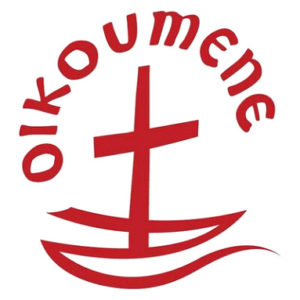
Ecumenism is fundamental in the theological, spiritual and communal life of MCC. As people who came from various Christian traditions and practices, we respect and welcome the rich and diverse traditions and practices of everyone who comes to the ‘table’ while maintaining our inherently Christian Identity as MCC, a progressive and queer affirming Church. What binds us as Christians is more important than what divides us. Our differences shall never divide us and we live in creative and loving tension with our differing Christian traditions.
We acknowledge that Christianity is but one way and one truth out of many diverse paths to experience and discern the Divine. We acknowledge that various peoples in various times and places understood and experienced the Divine differently from us. We uphold respectful and conversational engagement with people of other religious faiths as well as with people of No-faith. We shall work with them towards a shared ministry for a just and peaceful world.
Blessings and Material Wealth
All ‘blessings’ understood as material resources has already been provided and given by God through the natural world. The abundance of the planet earth is meant to be enjoyed, shared and developed by all human beings in sustainable ways that protect the same environment. However, human greed and brokenness has created systems and structures that concentrates and gathers the huge wealth of the earth for a few people while the huge majority are not only left to suffer and die, but are also exploited and abused by these very systems and structures in society. It must be resisted and challenged, any religious and theological perspective that God’s blessing belongs and is given only to a few elite, upper middle class and middle class people while the rest are believed to be destined to suffer in poverty, slavery and oppression. Equally a transactional understanding of blessing as many prosperity prophets proclaim, be resisted and challenged also; that if you give God money through the church, God will bless you with interest, siksik, lilig at umaapaw. God shows no partiality and God is not a banker. These theologies and ideologies are distorted and dysfunctional religious conception of God and God’s blessing in the world.
The same systems and structures of greed continues to destroy the climate of the world, the seas and oceans and their marine life as well as many local endemic ecological environments. Together with the many social problems of poverty, war and human oppression, our greatest threat today is the irreversible change of climate ultimately caused by human greed.
The Jews were told in Leviticus 25, that “the Land is the Lord’s” and therefore does not belong to anyone to destroy and exploit.
And in Acts 2:44 and Acts 4:32 we are showed of what a Christian community looks like, perhaps what human civilization should be:
They devoted themselves to the apostles’ teaching and fellowship, to the breaking of bread and the prayers.
Awe came upon everyone, because many wonders and signs were being done by the apostles. All who believed were together and had all things in common; they would sell their possessions and goods and distribute the proceeds* to all, as any had need. Day by day, as they spent much time together in the temple, they broke bread at home* and ate their food with glad and generous* hearts, praising God and having the goodwill of all the people. And day by day the Lord added to their number those who were being saved.
– Acts 2:42-47
Now the whole group of those who believed were of one heart and soul, and no one claimed private ownership of any possessions, but everything they owned was held in common. With great power the apostles gave their testimony to the resurrection of the Lord Jesus, and great grace was upon them all. There was not a needy person among them, for as many as owned lands or houses sold them and brought the proceeds of what was sold. They laid it at the apostles’ feet, and it was distributed to each as any had need.
– Acts 4:32-35
Saints, Prophets and Martyrs
Every baptized Christian is called to a live a life of holiness, kindness and service which is what a Christian saint is about. Every baptized Christian is called to be prophets in various times and places; prophets that denounce the evils of society; prophets that witness to God’s love and enduring hope. As with the first, second, third generation Christians and Christians of various ages and places who have died for their faith and their service of people, we are all called, should the time and circumstance demand, to die for the love of God and the love of people. We are called to be martyrs both in the literal sense should it come to that, and we are called to be martyrs internally; to die within ourselves, characters, attitudes and perspectives that perpetuate our personal greed and ego, and to live in Christ as Paul extensively explained in his letters.
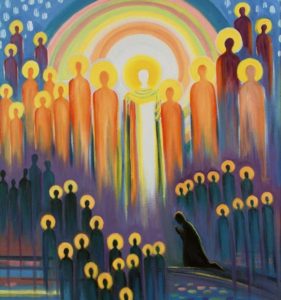
Veneration of Saints?
However, some will still ask about the veneration and prayer to the saints long gone. This is a specific tradition particular to the Roman Catholics and Easter Orthodox Christians, and some other traditions who followed their understanding of holy persons. Certainly there is no harm or injury in admiring and honoring the memory of people who have exemplified the Christian faith and life of service. As we honor in memory and in visual representation our deceased parents, siblings or partners, so too does some people, honor and celebrate the life and commitment of biblical people and of various saints of different times and places. Saints are people, living or otherwise. They may be remembered and honored but never worshiped or adored.
As to the question of prayer to the saints. All prayers are directed to God, even for those who pray for the intercession of saints. In the prayer formulas and devotions to saints, the prayer will always end or in one way or another, be directed towards God, through Jesus Christ. The belief of intercession comes from the fundamentals of the Nicene and Apostles creed when we declare “We believe in the communion of saints”.
We believe that the saints and all holy people who have died are already in the eternal presence of God, enjoying the perpetual glory of God’s face. The early Church during the Roman persecution, congregated in catacombs, and in particular in those specific catacombs where the martyrs were placed because they believed that though they be physically dead, the congregation gathering in worship continues to be in communion with those who have passed on, and that with them the Church on earth, and the Church of martyrs in heaven are one and together (in communion) in worshiping God through prayers, hymns and exhortations.
Should we pray to saints for their intercession? It is not necessary, but should you want to, I don’t think there is any injury in doing so, so long as you perfectly understand that it is God through Christ by the ever present Spirit who responds to our prayers.
Updated as of February 22, 2018
![07a6e-gay-christian-window[1]](https://opentablemcc.ph/wp-content/uploads/2015/02/07a6e-gay-christian-window1-300x225.jpg)